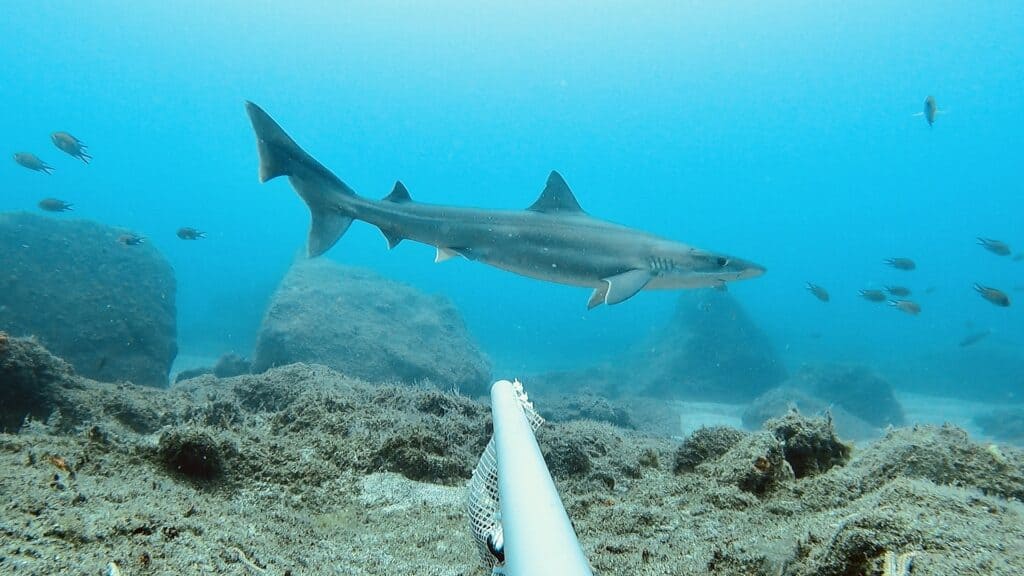
The post Are You Unknowingly Eating Endangered Shark Meat? appeared first on A-Z Animals.
Consumers rely on food labels to make choices about which foods they want to buy. You may want to avoid certain foods, for example, for ethical or health reasons. So, it is always a concern when studies show that some foods have been incorrectly labeled. One such study has recently revealed that shark meat for sale in the US was incorrectly labeled, leading to consumers unknowingly eating endangered shark species. Here we will outline the extent of the problem and the implications for shark conservation.
Shark Populations Under Threat

Many shark species are endangered.
©Carlos Grillo/Shutterstock.com
Shark populations are in serious decline throughout the world. The problem is so serious that 37 percent of the world’s sharks, rays, and chimaeras have been designated as Critically Endangered, Endangered, or Vulnerable by the International Union for Conservation of Nature. Fishing is the primary cause of this decline, and despite international conservation efforts, it still presents a major threat.
Shark Fishing and Meat
Shark fishing is driven by the demand for shark fins (used in shark fin soup) and meat. Some shark meat is sold as shark jerky, which is preserved meat that has been salted, seasoned, and dehydrated. Harvested sharks are also used for squalene, which is used in skin moisturizers. In recent years, the global trade of shark and ray meat has overtaken that of shark fins both in terms of value and volume. This is a reflection of the increase in the global demand for seafood, but also because of the overfishing of other fish species and regulations designed to reduce shark finning.
While most shark fins are exported to East and Southeast Asian countries (such as China), shark meat is consumed in South America, Europe, and the US.
Labeling Shark Meat
It is perfectly legal to sell correctly labeled shark meat from non-threatened species in the above regions. However, mislabeling and ambiguous labeling are common. For example, shortfin mako sharks have been labeled incorrectly as blacktip sharks, and other shark meat is simply labeled as ‘shark’. This practice has also been identified in other parts of the world. In Australia, products labeled as ‘shark’ were actually found to be chimaeras. It is also not unusual to find shark meat labeled using colloquial terms. In South Africa, shark meat has been found labeled as ‘ocean fillets’ and in the UK as ‘rock salmon’.
Implications of Poor Labeling
Colloquial and ambiguous labeling confuses consumers. Consumer surveys conducted in Brazil and Peru have shown that consumers thought that they were eating another fish product and not shark. Consumers may unknowingly purchase meat from endangered shark species. The use of generic labeling terms allows species that are subject to international trade restrictions under the Convention on International Trade in Endangered Species of Wild Fauna and Flora (CITES) to enter the market. Additionally, ambiguous labeling hinders efforts to monitor and manage threatened species. Declines in vulnerable species may go unnoticed.
The Need for This Study

Tope sharks are endangered.
There is currently only limited information on the shark meat trade. This means that there is no accurate data on exactly how much shark meat is being consumed and from which species. This data is needed to support marine diversity conservation initiatives. A study was needed to quantify how much ‘shark’ meat was being sold in the US. Importantly, the study needed to accurately identify the shark species using DNA barcoding, since visual identification is very difficult.
How the Study Was Conducted
The study was conducted by the University of North Carolina. Students and instructors collected 30 shark products between September 2021 and September 2022. The samples included 19 raw shark steaks and 11 shark jerky packages. They were collected from grocery stores, Asian markets, and online jerky vendors. The shark steak samples were collected from the East Coast of the US, specifically North Carolina, Florida, Georgia, and Washington D.C. Each of the samples was analyzed using DNA extractions to accurately identify the species.
Inaccurate Labeling Was Found
The researchers found that 31 percent of the samples were from sharks classified by the IUCN as Endangered or Critically Endangered species. All of them were ambiguously or incorrectly labeled. Out of all of the samples collected, only one was accurately labeled! That was from a black tip shark. Meat from three critically endangered species, the scalloped hammerhead shark, the great hammerhead, and the tope shark, was also found on sale and inaccurately labeled.
The Importance of These Findings
The sale of shark meat from endangered species can be concealed by inaccurate labeling. For example, the study found that meat from the scalloped hammerhead shark was on sale labeled simply as ‘shark’. This species is critically endangered, and its numbers continue to decline globally. Without correct labeling, there can be no transparency and traceability for products from endangered shark species. These are essential for maintaining a legal and sustainable trade in sharks and for preventing the sale of protected species.
The post Are You Unknowingly Eating Endangered Shark Meat? appeared first on A-Z Animals.
September 22, 2025 at 06:32PMSharon Parry
.jpeg)
.jpeg)

0 Comments